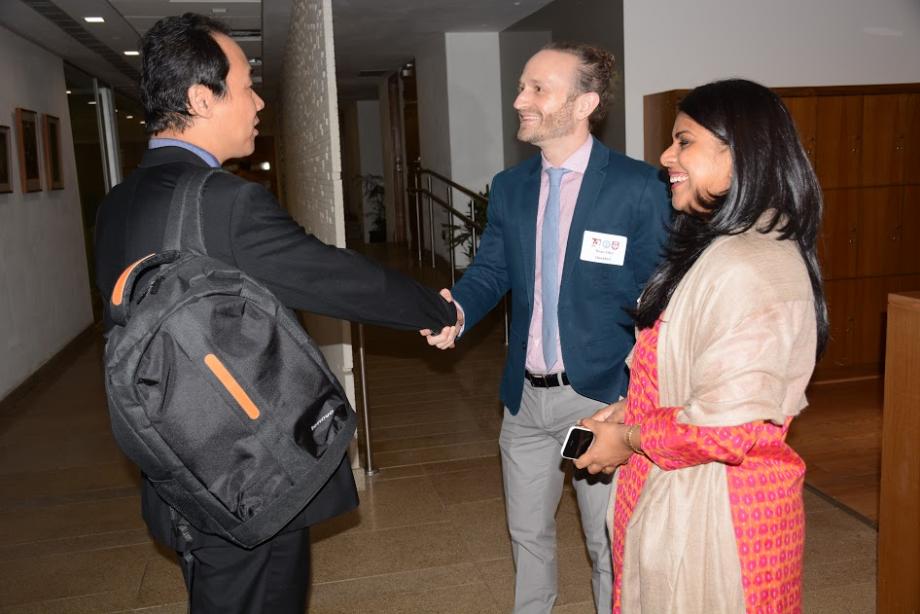Clinic Brings a Human-Rights Focus to Fight Against TB

The Law School’s International Human Rights Clinic launched an interdisciplinary project earlier this month with a conference in India titled “Developing a Rights-Based Approach to Tuberculosis.” The project aims to promote the development and implementation of a rights-based approach to preventing and treating tuberculosis in India, which is home to a quarter of the global TB cases. Lecturer in Law Brian Citro, the clinic’s Acting Associate Director, teamed up with two University of Chicago doctors and a U.K.-based health policy advisor to organize the event at the University’s new Center in Delhi.
“It was the first time ever that a truly diverse group of people working on TB in India came together to have a high-level conversation about human rights and TB,” Citro said. “TB is the second-deadliest infectious disease in the world after HIV, it is one of the oldest known diseases — but no one is really thinking about how rights can be used as a tool to help fight it.”
Although TB is largely curable, in 2013, there were about nine million new cases and 1.5 million deaths from the disease, mostly in low- and middle-income countries. A rights-based approach, Citro said, places the focus on the underlying social and economic issues, as well as the legal obligations of governments and health providers — critical steps in fighting a disease that disproportionately impacts people whose basic needs, such as food, housing, and access to healthcare, aren’t being met. In many areas, the disease also carries a stigma, with patients facing discrimination even after they have been cured.
“A rights-based approach empowers people with TB. It changes the power balance between the doctor and patient,” Citro said. “It also holds doctors and the health system to a higher standard.”
The conference brought together about 70 experts from 10 countries, including lawyers, doctors, researchers, human rights activists, government officials, and former TB patients. Law students Reilly Paul and Tyler Cerami, both ’16, contributed to the planning, and Paul accompanied Citro to the conference.
“After joining the clinic and doing just a little bit of research on TB in India I realized how much the disease affects women — not because of a biological susceptibility, but because of socio-economic vulnerabilities,” Paul said. “After reading about how some women are rejected by their families, have their belongings burned and face discrimination in the public sphere, I realized that women in particular would really benefit from a rights-based approach.”
Paul said the experience gave her the opportunity to learn about Indian law and build a variety of skills.
“It was very enlightening to travel to such a different country and speak with activists on the ground about their experiences,” she said. “Intellectually, it was very interesting to learn so much about the law of another country and be able to compare and contrast it with our own system.”
Conference organizers included two doctors, Assistant Professor of Medicine Evan Lyon and Health Services Research Fellow Kiran Raj Pandey, as well as Mihir Mankad of Save the Children. The event covered a variety of aspects of the rights-based approach, including discussions about TB “hot spots” in slums and other highly affected areas; lessons from the doctors’ work in Nepal and Haiti; the growing problem of drug-resistant TB; vulnerable groups, such as prisoners, migrants, and people living with HIV; and access to quality diagnostics for the disease, which are often very expensive.
The rights-based approach to TB is modeled on global rights-based campaigns against HIV, which have been successful at mobilizing communities, spurring research, increasing access to medicines, and arming patients with information about the disease, their treatments, and their legal rights.
But the fight against TB faces a number of unique hurdles — including the fact that it is curable. TB patients who recover often don’t have incentives to mobilize and join the cause the way a patient with a chronic disease like HIV might. What’s more, TB tends not to affect those with the resources to mobilize. This also means it is not profitable for drug companies to invest in research and development for new TB drugs. As a result, there have only been two new drugs for TB in the last 40 years.
“In the developed, wealthy world, TB isn’t really on the radar because it has largely been controlled in wealthy countries,” Citro said.
The conference has already spurred future work. The four organizers will guest edit a special issue of the Health and Human Rights Journal at the Harvard School of Public Health, focusing on TB and the right to health. This spring Citro will return to India to train government TB officers in Karnataka on a rights-based approach. Students Paul and Cerami have drafted the legal section of an advocacy handbook to be used in the Parliament of India to advocate for a rights-based approach to TB. Citro and the other organizers have asked for funding to conduct a judicial sensitization workshop at the Center in Delhi to promote knowledge about the relationship between TB and human rights in the Indian judiciary. They also plan to present a lecture series in Beijing and Hong Kong to begin disseminating their ideas beyond India.
“The real success of the conference is that it started a dialog,” Citro said. “Many of the people we brought together hadn’t thought about tuberculosis from a human-rights perspective. Now other work is coming from it.”